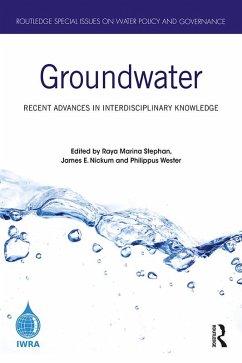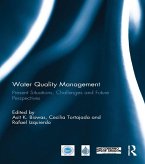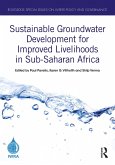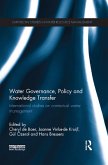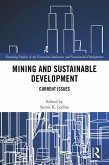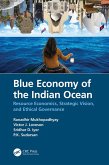Groundwater (eBook, PDF)
Recent Advances in Interdisciplinary Knowledge
Redaktion: Stephan, Raya Marina; Wester, Philippus; Nickum, James E.
42,95 €
42,95 €
inkl. MwSt.
Sofort per Download lieferbar

21 °P sammeln
42,95 €
Als Download kaufen

42,95 €
inkl. MwSt.
Sofort per Download lieferbar

21 °P sammeln
Jetzt verschenken
Alle Infos zum eBook verschenken
42,95 €
inkl. MwSt.
Sofort per Download lieferbar
Alle Infos zum eBook verschenken

21 °P sammeln
Groundwater (eBook, PDF)
Recent Advances in Interdisciplinary Knowledge
Redaktion: Stephan, Raya Marina; Wester, Philippus; Nickum, James E.
- Format: PDF
- Merkliste
- Auf die Merkliste
- Bewerten Bewerten
- Teilen
- Produkt teilen
- Produkterinnerung
- Produkterinnerung

Bitte loggen Sie sich zunächst in Ihr Kundenkonto ein oder registrieren Sie sich bei
bücher.de, um das eBook-Abo tolino select nutzen zu können.
Hier können Sie sich einloggen
Hier können Sie sich einloggen
Sie sind bereits eingeloggt. Klicken Sie auf 2. tolino select Abo, um fortzufahren.

Bitte loggen Sie sich zunächst in Ihr Kundenkonto ein oder registrieren Sie sich bei bücher.de, um das eBook-Abo tolino select nutzen zu können.
This book contributes to UN Water Groundwater year (2022), and to the effort of "making the invisible, visible". An insightful resource for researchers and planners in the field of environmental policies, water laws, climate change and groundwater governance, this book comes with a new Introduction.
- Geräte: PC
- mit Kopierschutz
- eBook Hilfe
Andere Kunden interessierten sich auch für
![Groundwater (eBook, ePUB) Groundwater (eBook, ePUB)]() Groundwater (eBook, ePUB)42,95 €
Groundwater (eBook, ePUB)42,95 €![Water Quality Management (eBook, PDF) Water Quality Management (eBook, PDF)]() Water Quality Management (eBook, PDF)30,95 €
Water Quality Management (eBook, PDF)30,95 €![Sustainable Groundwater Development for Improved Livelihoods in Sub-Saharan Africa (eBook, PDF) Sustainable Groundwater Development for Improved Livelihoods in Sub-Saharan Africa (eBook, PDF)]() Sustainable Groundwater Development for Improved Livelihoods in Sub-Saharan Africa (eBook, PDF)42,95 €
Sustainable Groundwater Development for Improved Livelihoods in Sub-Saharan Africa (eBook, PDF)42,95 €![Water Governance, Policy and Knowledge Transfer (eBook, PDF) Water Governance, Policy and Knowledge Transfer (eBook, PDF)]() Water Governance, Policy and Knowledge Transfer (eBook, PDF)49,95 €
Water Governance, Policy and Knowledge Transfer (eBook, PDF)49,95 €![Mining and Sustainable Development (eBook, PDF) Mining and Sustainable Development (eBook, PDF)]() Mining and Sustainable Development (eBook, PDF)42,95 €
Mining and Sustainable Development (eBook, PDF)42,95 €![Disaster Risk, Resilient Agriculture and Livelihood (eBook, PDF) Disaster Risk, Resilient Agriculture and Livelihood (eBook, PDF)]() Disaster Risk, Resilient Agriculture and Livelihood (eBook, PDF)42,95 €
Disaster Risk, Resilient Agriculture and Livelihood (eBook, PDF)42,95 €![Blue Economy of the Indian Ocean (eBook, PDF) Blue Economy of the Indian Ocean (eBook, PDF)]() Ranadhir MukhopadhyayBlue Economy of the Indian Ocean (eBook, PDF)48,95 €
Ranadhir MukhopadhyayBlue Economy of the Indian Ocean (eBook, PDF)48,95 €-
-
-
This book contributes to UN Water Groundwater year (2022), and to the effort of "making the invisible, visible". An insightful resource for researchers and planners in the field of environmental policies, water laws, climate change and groundwater governance, this book comes with a new Introduction.
Dieser Download kann aus rechtlichen Gründen nur mit Rechnungsadresse in A, B, BG, CY, CZ, D, DK, EW, E, FIN, F, GR, HR, H, IRL, I, LT, L, LR, M, NL, PL, P, R, S, SLO, SK ausgeliefert werden.
Produktdetails
- Produktdetails
- Verlag: Taylor & Francis eBooks
- Seitenzahl: 386
- Erscheinungstermin: 21. Februar 2023
- Englisch
- ISBN-13: 9781000837629
- Artikelnr.: 67323454
- Verlag: Taylor & Francis eBooks
- Seitenzahl: 386
- Erscheinungstermin: 21. Februar 2023
- Englisch
- ISBN-13: 9781000837629
- Artikelnr.: 67323454
- Herstellerkennzeichnung Die Herstellerinformationen sind derzeit nicht verfügbar.
Raya Marina Stephan, IWRA fellow and former Director, is an international consultant, expert in water law. She is the Deputy Editor-in-Chief of Water International. James E. Nickum, IWRA Fellow, Global Reach Awardee, and former Vice-President, is the Editor in Chief of Water International, non-resident Professorial Research Associate at the School of Oriental and African Studies (SOAS), University of London and non-resident Adjunct Senior Research Fellow at the East-West Center, Honolulu, Hawaii. Philippus Wester, IWRA Fellow and former Director, is Regional Programme Manager, Mountain Knowledge & Action Networks at ICIMOD and a former Deputy Editor-in-Chief of Water International.
Introduction Part 1: Groundwater institutions 1. From an open-access to a
state-controlled resource: the case of groundwater in the Kathmandu Valley,
Nepal 2. Pathways for effective groundwater governance in the
least-developed-country context of the Lao PDR 3. Using backcasting to
explore ways to improve the national water department's contribution to
good groundwater governance in South Africa 4. Groundwater governance
through institutional bricolage? Participation in Morocco's Chtouka aquifer
contract Part 2: Groundwater management 5. Exploring the future impacts of
urbanization and climate change on groundwater in Arusha, Tanzania 6.
Impact of land use and occupation on potential groundwater recharge in a
Brazilian savannah watershed 7. Problems and promise of managed recharge in
karstified aquifers: the example of Lebanon 8. A multifaceted quantitative
index for sustainability assessment of groundwater management: application
for aquifers around Iran Part 3: Groundwater users 9. Whither collective
action? Upscaling collective actions, politics and basin management in the
process of 'legitimizing' an informal groundwater economy 10. Participatory
rural appraisal to assess groundwater resources in Al-Mujaylis, Tihama
Coastal Plain, Yemen 11. Federal reserved rights and California's
Groundwater Management Act: resolving groundwater rights tensions in
California and the western United States Part 4: Groundwater for irrigation
12. Learning from the past to build the future governance of groundwater
use in agriculture 13. Drivers of groundwater utilization in water-limited
rice production systems in Nepal 14. Groundwater policies and irrigation
development: a study of West Bengal, India, 1980-2016 Part 5: Transboundary
aquifers 15. Transboundary groundwater governance in the Guarani Aquifer
System: reflections from a survey of global and regional experts 16. A
methodology to identify vulnerable transboundary aquifer hotspots for
multi-scale groundwater management 17. Binational reflections on pathways
to groundwater security in the Mexico-United States borderlands 18. A
critical review of the transboundary aquifers in South-Eastern Europe and
new insights from the EU's water framework directive implementation process
state-controlled resource: the case of groundwater in the Kathmandu Valley,
Nepal 2. Pathways for effective groundwater governance in the
least-developed-country context of the Lao PDR 3. Using backcasting to
explore ways to improve the national water department's contribution to
good groundwater governance in South Africa 4. Groundwater governance
through institutional bricolage? Participation in Morocco's Chtouka aquifer
contract Part 2: Groundwater management 5. Exploring the future impacts of
urbanization and climate change on groundwater in Arusha, Tanzania 6.
Impact of land use and occupation on potential groundwater recharge in a
Brazilian savannah watershed 7. Problems and promise of managed recharge in
karstified aquifers: the example of Lebanon 8. A multifaceted quantitative
index for sustainability assessment of groundwater management: application
for aquifers around Iran Part 3: Groundwater users 9. Whither collective
action? Upscaling collective actions, politics and basin management in the
process of 'legitimizing' an informal groundwater economy 10. Participatory
rural appraisal to assess groundwater resources in Al-Mujaylis, Tihama
Coastal Plain, Yemen 11. Federal reserved rights and California's
Groundwater Management Act: resolving groundwater rights tensions in
California and the western United States Part 4: Groundwater for irrigation
12. Learning from the past to build the future governance of groundwater
use in agriculture 13. Drivers of groundwater utilization in water-limited
rice production systems in Nepal 14. Groundwater policies and irrigation
development: a study of West Bengal, India, 1980-2016 Part 5: Transboundary
aquifers 15. Transboundary groundwater governance in the Guarani Aquifer
System: reflections from a survey of global and regional experts 16. A
methodology to identify vulnerable transboundary aquifer hotspots for
multi-scale groundwater management 17. Binational reflections on pathways
to groundwater security in the Mexico-United States borderlands 18. A
critical review of the transboundary aquifers in South-Eastern Europe and
new insights from the EU's water framework directive implementation process
Introduction Part 1: Groundwater institutions 1. From an open-access to a
state-controlled resource: the case of groundwater in the Kathmandu Valley,
Nepal 2. Pathways for effective groundwater governance in the
least-developed-country context of the Lao PDR 3. Using backcasting to
explore ways to improve the national water department's contribution to
good groundwater governance in South Africa 4. Groundwater governance
through institutional bricolage? Participation in Morocco's Chtouka aquifer
contract Part 2: Groundwater management 5. Exploring the future impacts of
urbanization and climate change on groundwater in Arusha, Tanzania 6.
Impact of land use and occupation on potential groundwater recharge in a
Brazilian savannah watershed 7. Problems and promise of managed recharge in
karstified aquifers: the example of Lebanon 8. A multifaceted quantitative
index for sustainability assessment of groundwater management: application
for aquifers around Iran Part 3: Groundwater users 9. Whither collective
action? Upscaling collective actions, politics and basin management in the
process of 'legitimizing' an informal groundwater economy 10. Participatory
rural appraisal to assess groundwater resources in Al-Mujaylis, Tihama
Coastal Plain, Yemen 11. Federal reserved rights and California's
Groundwater Management Act: resolving groundwater rights tensions in
California and the western United States Part 4: Groundwater for irrigation
12. Learning from the past to build the future governance of groundwater
use in agriculture 13. Drivers of groundwater utilization in water-limited
rice production systems in Nepal 14. Groundwater policies and irrigation
development: a study of West Bengal, India, 1980-2016 Part 5: Transboundary
aquifers 15. Transboundary groundwater governance in the Guarani Aquifer
System: reflections from a survey of global and regional experts 16. A
methodology to identify vulnerable transboundary aquifer hotspots for
multi-scale groundwater management 17. Binational reflections on pathways
to groundwater security in the Mexico-United States borderlands 18. A
critical review of the transboundary aquifers in South-Eastern Europe and
new insights from the EU's water framework directive implementation process
state-controlled resource: the case of groundwater in the Kathmandu Valley,
Nepal 2. Pathways for effective groundwater governance in the
least-developed-country context of the Lao PDR 3. Using backcasting to
explore ways to improve the national water department's contribution to
good groundwater governance in South Africa 4. Groundwater governance
through institutional bricolage? Participation in Morocco's Chtouka aquifer
contract Part 2: Groundwater management 5. Exploring the future impacts of
urbanization and climate change on groundwater in Arusha, Tanzania 6.
Impact of land use and occupation on potential groundwater recharge in a
Brazilian savannah watershed 7. Problems and promise of managed recharge in
karstified aquifers: the example of Lebanon 8. A multifaceted quantitative
index for sustainability assessment of groundwater management: application
for aquifers around Iran Part 3: Groundwater users 9. Whither collective
action? Upscaling collective actions, politics and basin management in the
process of 'legitimizing' an informal groundwater economy 10. Participatory
rural appraisal to assess groundwater resources in Al-Mujaylis, Tihama
Coastal Plain, Yemen 11. Federal reserved rights and California's
Groundwater Management Act: resolving groundwater rights tensions in
California and the western United States Part 4: Groundwater for irrigation
12. Learning from the past to build the future governance of groundwater
use in agriculture 13. Drivers of groundwater utilization in water-limited
rice production systems in Nepal 14. Groundwater policies and irrigation
development: a study of West Bengal, India, 1980-2016 Part 5: Transboundary
aquifers 15. Transboundary groundwater governance in the Guarani Aquifer
System: reflections from a survey of global and regional experts 16. A
methodology to identify vulnerable transboundary aquifer hotspots for
multi-scale groundwater management 17. Binational reflections on pathways
to groundwater security in the Mexico-United States borderlands 18. A
critical review of the transboundary aquifers in South-Eastern Europe and
new insights from the EU's water framework directive implementation process
